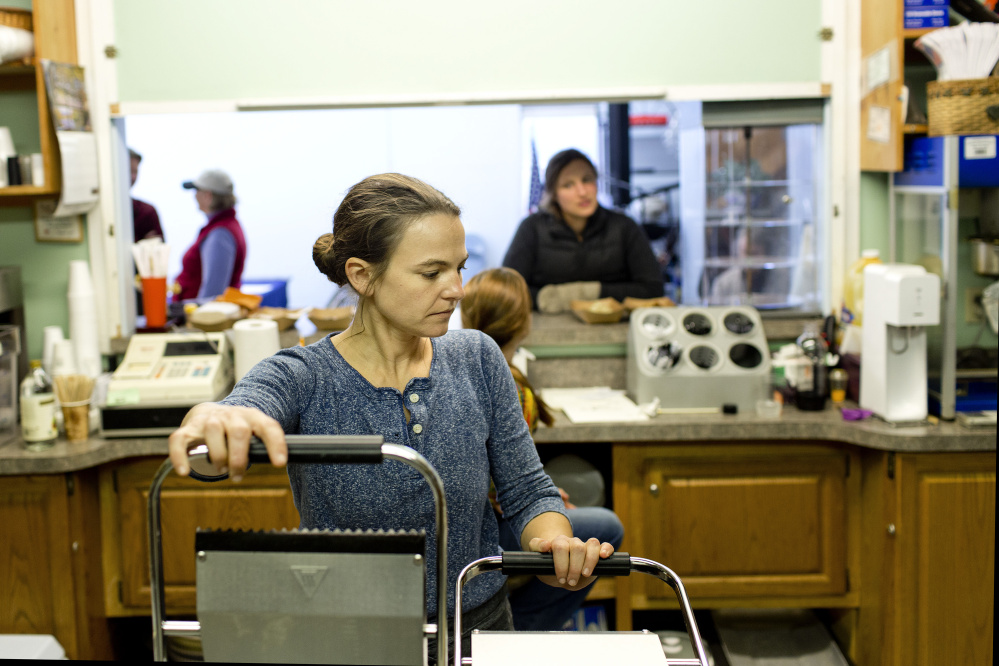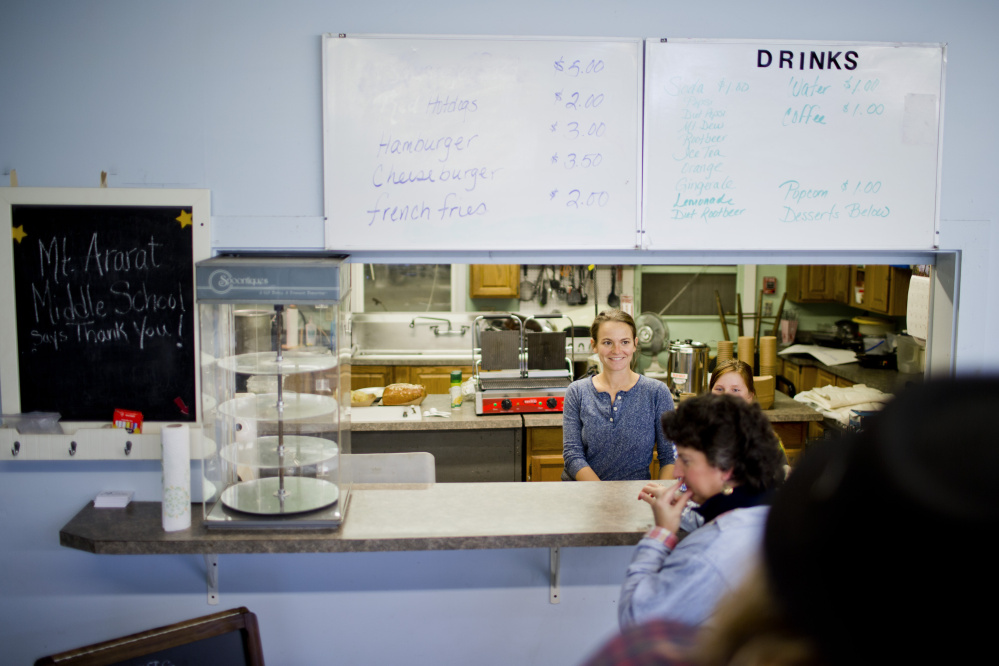Jenn Legnini has a newish farm and a very new restaurant, but neither quite fit traditional definitions. Turtle Rock, her farm/”craft cannery” in Brunswick, comprises just one-third of an acre for vegetables, although her commercially licensed kitchen is filled with both percolating pots and ideas for value-added products. Her restaurant is a cafe at the Midcoast Winter Farmers’ Market, which opened this month, making the Topsham market the first in the state to have its own cafe (or so Leigh Hallett, executive director of the Maine Federation of Farmers’ Markets believes).
We called Legnini up to talk farm-to-table panini, how sustainable her cafe food is and how the daughter of Pennsylvania sheep farmers got from there to here.
BACKGROUND: First off, Legnini is pronounced “lee-knee-knee,” and yes, she does have Italian blood. “I am very Italian, heart and soul,” she says. This means canning tomatoes is a priority for her every year. There were farmers on both sides of her family, including her father’s Italian ancestors. “I was around food and production a lot.” Nonetheless, she studied art in school and worked as a graphic designer for a year before moving to Montana to work on a nonprofit sustainable ranching operation.
ROCKY MOUNTAIN FEVER: In 2008, she enrolled in a culinary program in Colorado that combined a classic French education with a farm-to-table approach. “It’s great to learn all the techniques, but the integrity of your flavor starts with the sourcing of the raw product,” she said. “It was the first step to nurturing these ideas for me.” The next step was Maine, where she’d been trying to move “for years.” But finding a job to move for was frustrating. “I decided to drive here and find a job when I got here.” Her first gig was cooking on the line at Portland’s Five Fifty Five.
GOOD MORNING: Her growing attraction to farming dovetailed with her decreasing interest in working late nights. She was a MOFGA apprentice at Laughing Stock Farm in Freeport, then went on to farming and value-added production at Left Field Farm in Bowdoinham. In 2014 she started Turtle Rock. She’s looking for more land somewhere close by, where she can focus on two crops – beets will likely be one of them because she is a huge fan, especially of baby beets – and a lot of products like the pickles, sauces and spreads she makes now.
WHY MAINE: Why did she have those wheels pointed toward Maine? As a child, Legnini went to summer camp on the Blue Hill Peninsula in Sargentville near Walker Pond. “We would rake blueberries, and there was a huge garden there and we would go get our own fish and do so many things outside.” If her parents wished she hadn’t moved so far away, they have only themselves to blame, she said. It wasn’t just the memories though, but Maine’s intense focus on its food system, and “the land and the sea and the small communities. I grew up seeing a lot of that fading away in Pennsylvania.”
ON THE MENU: Those ideas are in full blossom at the Market Cafe at the Midcoast Winter Farmers’ Market (held from 1 to 5 p.m. every Friday at the Topsham Fairgrounds’ Exhibition Hall off Fairgrounds Road). Born of a brainstorming session at the end of last year’s winter market, the cafe is intended to serve both the vendors and the shopping public.
She’ll offer two $7 panini (the equipment is “pack in and pack out for me”), one vegetarian and one with meat, and a soup. The sandwiches might include something like maple roasted turkey with a lightly spiced carrot and daikon slaw or an herbed mushroom, braised chard and Winter Hill Farm (the Freeport cheesemaker) tome, topped with an apple-parsnip butter.
HYPER LOCAL: As much as she can, Legnini is working with ingredients available for sale in the market around her. She’s got three bakers to choose from for the sandwich bread, the King & I Angus, the Farmer’s Daughter and Paula C’s Baked Goods.
In her first week she served a Tuscan kale and white bean soup. “That was almost 100 percent from Fairwinds Farm,” Legnini said, “which was fun because she (Fairwinds farmer Cathy Karonis) is the market manager.”
PACK IT IN: Legnini also co-packs for other farmers. If she hears a farmer lamenting unsold tomatoes, she’ll jump in. “I’ll say, ‘Let’s make you some salsa and sell it under your farm name.’ ” When we talked, she’d just spent three days pickling ginger. Maine-grown ginger never grows the tougher, brown skin that you see on the ginger in the supermarket – the season here simply isn’t long enough. “So I’m like, before it turns, let’s pickle it and make it another gorgeous little thing,” she said. “I love this part of it. I am so grateful I have gotten to this place.”
Send questions/comments to the editors.





Comments are no longer available on this story